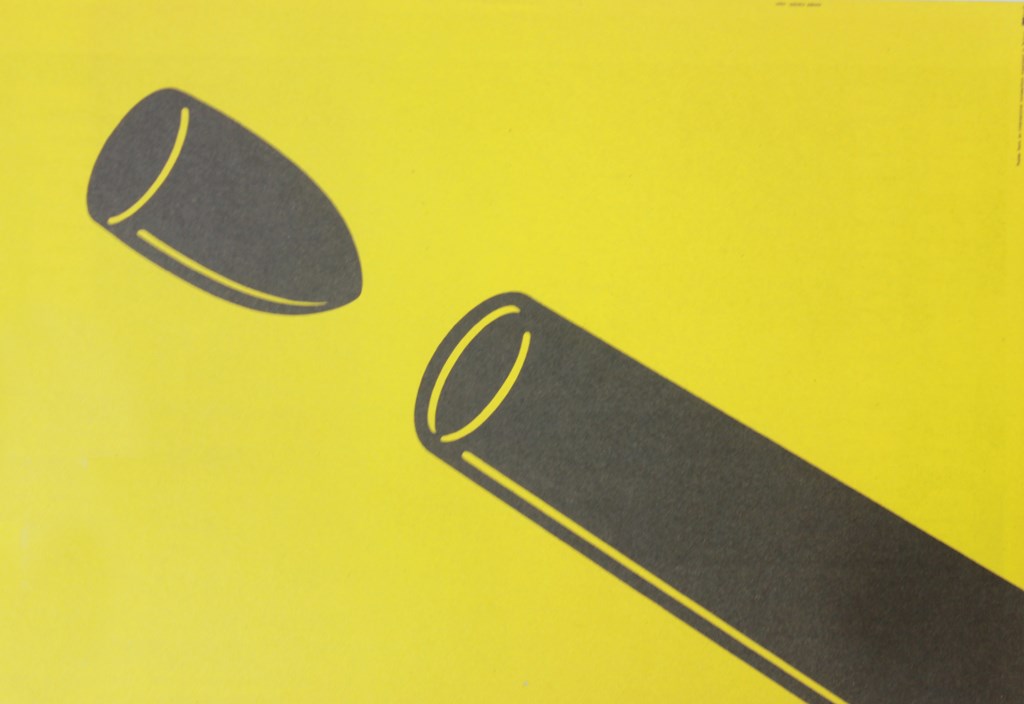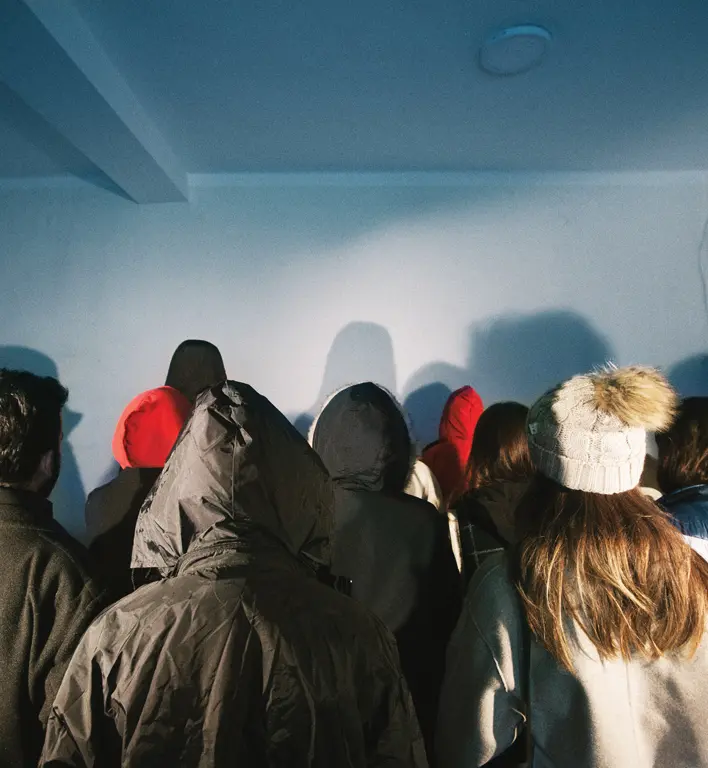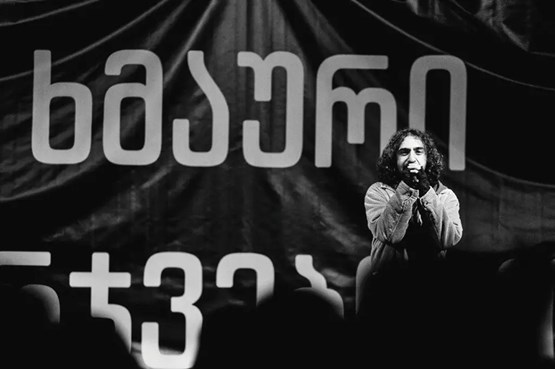
Baboulik’s Look—Contours of Future Protest
18.02.2019 | 10 Min to readUpbringing
The most striking feature of debates on Tbilisi-based clubs involves discussions about the educational function, so to speak, of this scene. Giorgi Kikonishvili, in his article, BASSIANI of Our Time, analyzes the reasons behind the popularity of BASSIANI Club, and concludes that scrutinizing these reasons reveals that the establishment “has acquired the function of a brand new sociocultural space and movement in Georgia,” and “it becomes clear that why so many people have developed deep intellectual and emotional bonds with this space, beyond purely entertainment purposes.” According to Kikonishvili, in this space, “Babouliks[1] […] drop their phony habits, their strictly defined aggressive image, and their perceived privileges,” which endows “BASSIANI with a function of an emancipating movement.”
Naja Orashvili, one of the founders of BASSIANI, stated on the Mdzime Katstan TV show that “people who have emerged from the ghetto, those once looking up to the mobster and street-smart mentality… now behave differently on the dance floor. They are self-absorbed, never bothering anyone.” Moreover, according to Orashvili, those to whom he refers as “the baboulik subculture are the key driving force behind the club, and the babouliks… have transformed into babou-queers. They have overcome homophobia, fighting for equality, participating in every rally, and never turning a blind eye to violence.”
Even Giorgi Ghvinjilia, who is far more critical toward Tbilisi’s clubs, admits the actuality of their educational function in his article titled “Face Control and Politics.” Moreover, he considers it to be pivotal. According to Ghvinjilia, clubs represent a space “where face control separates light from darkness, backwoods tastelessness from fashionable gaudiness, those who know how to have fun from those who still have a chance at learning or those who will never learn.” Next, this space compels those on the dark side to learn “what movies to watch, what music to listen, how to dress, what church to attend, and how to behave in a club.”
Interestingly, all three quotes not only describe an educational function, but also identify its objects, a group of people brought up, educated within a club. So who are these babouliks “from the ghetto” described by Kikonishvili and Orashvili? Who are these pupil? And, more importantly, who are their educators?
On baboulik genealogy
Despite the fact—or, maybe because of the fact—that the term baboulik is so popular and widespread, it is very difficult to grasp its exact meaning. As far as I know, no one has worked on its origin and semantic change.
The emergence of babouliks in popular culture is related to the TV series My Wife’s Girlfriends. In the first season, we meet a young businessman, Dito, and his friends, successful upscale “new Georgians” with wannabe street-smart manners, showing off their aggressive masculine image, and never missing a chance to underline their privileged status. Most importantly, they refer to one another, and others, as babou, hence the term. Notably, the audience found this unique (and new) mix to be very appealing. Despite their unmistakably satirical portrayal in the series, babouliks turned into role models of sorts, and even romantic figures to certain social strata, which is likely to have boosted the term’s popularity. Although the word baboulik in this sense—that is, a wise-guy-turn-nouveau-riche who clings to his old ways—has not gained a foothold, and its meaning, as found in both the quoted authors and colloquial use, drastically differs from that offered by the series.
For example, the term if defined totally differently on Chitipedia, one of the first Georgian satirical online publications with user-generated content. Chitipedia dedicates three entries to the term baboulik: one featuring Dito Sharashenidze, said character from My Wife’s Girlfriends, the second (kochli baboulik: limping baboulik) is in fact used to denote a street-smart wise-guy—with the description of a baboulik’s clash with a pig (police officer) or some lowlife, leaving the baboulik with an injured leg, though subsequently rehabilitating—and the third definition (outgoing babouliks) is especially interesting for our purpose, because it stands for babouliks transformed in and by clubs.
According to the third entry, outgoing babouliks are a new breed of babouliks “frequenting different Tbilisi electronic music rave parties,” who differ from “regular babouliks” in that “they lead an erratic, odd, benevolent, bohemian lifestyle.” The entry describes outgoing babouliks imbibe the aesthetics of club culture: “Outgoing babouliks often have tattoos with spiritual meanings like flower of life, oddly shaped figures found on Tumbler, various chemical formulas, or far out symbols. For their Facebook cover photos outgoing babouliks often use images of Buddha or pictures with inscriptions like drop acid, not bombs or chill, or other far-out photos with blunts, joints, or blurred LSD trip-like colors. An outgoing baboulik must be versed in electronic music, must love old techno, or goa trance, or old school hop-hop. Outgoing baboulik prefer the sound of vinyl because it is clearer, and because it kicks ass. They also listen to intellectual dance music, and shamanic ritual recordings.
The authenticity of their behavior is also questions: “Even if outgoing babouliks are not really outgoing, their facial expressions are still outgoing.” The favorite drugs of outgoing babouliks include LSD, ecstasy, magic mushrooms, and other psychedelic substances—even if they have never tried them. For the most part, outgoing babouliks are kind, but they are far-out, so they don’t give a fuck—and even if they are not far out, they still keep up that perception.”
The main problem plaguing outgoing babouliks is hard to miss. They are not far-out enough, or rather sufficiently out. Their communion with club spaces is amateurish, therefore it lacks refinement and depth, never going further than superficial image-making. Consequently, genuine emancipation, “freeing oneself from one’s own fake habits,” has yet to take place. All this turns an outgoing baboulik into an unreliable and untamable, and even somewhat annoying character. If babouliks described by Orashvili are “self-absorbed,” Chitipedia’s outgoing babouliks are brazen enough to approach “those just stoned,” and to describe to them how they appear in their trips: “Damn, dude, you have no fucking idea how you look!” or “I’m looking at you, and I fucking see six of you, man!”
In a nutshell, at this early stage of babouliks clubbing emergence—the entry was last updated in June of 2013—it is too early to talk about babou-queers. And that because the entry fails to introduce the other, and more important, element—the educator.


Photo: Lasha (Fox) Tsertsvadze
Westman and Baboulik
On July 26, 2017, Radio Liberty published an interview with Sandro Gvindadze, one of the creators of the new animation series Westman and Baboulik. According to Gvindadze, the series is designed to counter the anti-Western propaganda and stereotypes challenging the country. The series’ characters, Westman and Baboulik, “drastically differ from each other.” Westman, that is, the Western Man, who is, by the way, a Georgian IT guy, wants to put to use his knowledge, such as fact checking and media literacy, for the benefit of society, while Baboulik is a victim of propaganda, a “sick” man, whom Westman cures with his superpowers in every episode, and expels Russian propaganda and Soviet myths from him.
In the opening episode called 37-Rouble Legend, Westman debunks for Baboulik one myth claiming that men in Soviet Georgia could fly to Moscow, enjoy ice-cream there, fool around with Russian women, and fly back, and all that for just 37 rubles. In reality, Westman explains, a round-trip air fare was much higher than 37 rubles. Add to that accommodation and taxi costs, and money you would need to get laid—“a pint of vodka would buy you only fat, ugly, and drunk bitches at best.” In the end, an adventure of this kind would cost 250 rubles, twice the average monthly salary at that time, an amount only corrupt Soviet officials could afford. In contrast, Westman continues, today Baboulik can fly from Kutaisi to Europe and have fun for 700-800 GEL, less than 1013 GEL, the current average salary. Apparently, Baboulik cannot do that because he is between jobs, and that because is a jack of all trades, master of none. Nonetheless, he, realizing that he fell for myths composed by corrupt people, decides to learn English.
This series is noteworthy in several ways.
The creators, similar to Kikonishvili or Ghvinjilia, for example, view this ongoing social confrontation and the process of upbringing strictly in the form of dialogue between two men.
From the aggressive nouveau riche baboulik in My Wife’s Girlfriends, the baboulik develops into a tolerable yet still annoying character, and ultimately blossoms here into a tamed entity, an A student, someone perceived by Kikonishvili and Orashvili as a suitable object for upbringing. The social contours of this group also come forward. Baboulik is poor and unemployed, and he does not speak English, and, most importantly, the series explains why. The problem does not lie in the country’s economic state, for example, but in Baboulik’s erring conscious. He is overly confident about his capabilities, takes Soviet myths at face value, and idles away. But there is a simple solution. If Westman explains to him how easily he can switch from dwelling on the past glory of to having fun in Europe or Tbilisi’s clubs, Baboulik’s mentality will do an about-face. He will learn English, break free from captivity to Russian propaganda, and live a better life.
Westman and Baboulik clearly demonstrates the previously concealed, essential meaning of this dichotomy—the clash between the Western and Eastern, Orientalized individuals. The series even offers physiological visualizations of this conflict, with Westman being blond, and Baboulik has dark hair.
Accordingly, Baboulik, in this dialogue, acquires the function traditionally ascribed in Western orientalist thought to an Eastern person, a strictly passive object. Dialogue is not the way to counter Russian propaganda, or respect for the opponent’s views and arguments, or even dispute. The way lies in one-sided education, when someone knowledgeable and successful enlightens someone uneducated, a loser. Both Orashvili and Kikonishvili describe only that which changes the babouliks within the BASSIANI context. The counter process, ushering in babouliks into club culture, is nowhere to be found. Still, Orashvili, on the Mdzime Katstan show, started his discourse about babou-queers by stating that what attracts foreign performers to Tbilisi’s clubs most is their audiences, those who “fight for liberation on the dance floor,” and who embrace these clubs as “symbols of liberation.” In a word, the baboulik is the key club attraction. The baboulik’s function in the club, however, is limited to “liberating” from himself, to reject himself, and to learn. Nobody learns from the baboulik. He does not get to decide what to learn. And it the baboulik is self-absorbed, and does not bother anyone with his stare, he, on eth contrary, is constantly under surveillance, and stories about him are spread around.
The main reason behind all this lies in Westman’s secondary West-ness. Notwithstanding his name, Westman is not Westerner; he is a man of the West. Tbilisi and Rave Policy, an article by the Resident Advisor electronic music online publication, speaks about young Georgians who have lived abroad, “in places like Germany,” and “who have brought back home their definitive techno culture experience.” According to the article, these very people are now creating raves, events, which “bear witness to a new era in [the history] of Georgia and reflect the suffusion of liberal Western values into society.” The dialogue between Westman and Baboulik simply cannot be bilateral, because it content—meaning what one must teach, and what the other must learn—was defined long ago, back when Westman was maturing into a man of the West. And this dialogue appeals to “foreign performers” and techno publications exactly because it is a real or perceived show staged for Westerners. Its simplified structure may be expressed as “Advisor watches Westman educate Baboulik.”
* * *
As we have seen, these notions, Westman and Baboulik, are quite controversial and obscure in nature. It is unclear who exactly is meant by them, and it is very unlikely that anyone will identify oneself with one or the other. They seem to exist only in our consciousness. Nonetheless, these notions are (hyper)real in that they define how we perceive others and ourselves, with whom and under what circumstances we establish ties, how we behave in clubs, for example. They may even define things far more important, for example, the fact that babou-queers are always the first to show up for “every rally,” though the goals of such rallies are put forth by the Westmen.
Thus, the situation described above raises numerous questions, including about the solution, for instance. What Giorgi Ghvinjilia wants to know is how the political and cultural elites should respond to this situation, and what they must offer to the babouliks instead of this superficial propaganda of “brainwashing.” What I want to know is the position of the people in discussion. What should those do who have found themselves under cultural and discursive domination? Those who are urged to free from themselves? Those labeled as passive objects and told what to learn and how? Those who are being constantly watched and yet prohibited from watching? To answer these questions, entire disciplines of social sciences have been created, and, needless to say, this article does not claim to have answered them. Still, I believe that one excellent representative of Georgian online culture provides several interesting answers.
Mavani
In late 2015, the Bina 18 (Apartment 18) show from GDS TV Company was supplemented with a new segment, Roberto Mavani, featuring simple-format short skits: the celebrity host attends various, mostly entertaining, events, such as a beauty pageant Miss Breast, for instance, or a golf tournament, and ridicules the event by asking provocative questions and defying the code of conduct at a given gathering. The segment quickly gained popularity, and continues to maintain a large following, and that despite the fact that the show was officially canceled, and the author was forced to keep it going at a different TV station, under a different name, and in a different format. The show’s archived videos are still big on YouTube.
Mavani has visited numerous clubs and electronic music performances, though three of them deserve special mention.
In the first skit titled “Roberto Mavani Ridiculing Hard,” the host mocks the ritual of going clubbing. He learns from his friends that Dixon is in town, so he buys a blotter because “visuals will rock his world,” makes sure he has a bottle of water, and asks the seller to pour him some tea, because “he’s about to go tripping way out.” Finally, under the influence, he plunges into “self-absorption.”
In the second installment, “Roberti Mavani at GEM FEST Winter Party,” the host serves an improvised meal with wine, bread, and a few dishes right in the middle of a live performance, and raises a toast together with other members of the audience.
In the third video, Roberto Mavani Clubbing, Mavani goes bugging the club’s guests, annoying them with questions like when they met the DJ first, monitoring and describing their behavior all the while, and going back at them with more questions like what kind of music they prefer. The final scene offers a bird’s eye view of the concert, and Mavani announces, “Meet 8,000 far-out Georgians.”
These skits seem interesting in that they offer several strategies.
Mavani’s character is an elusive subject that in many ways resembles the baboulik described by Kikonishvili. His facial expressions and speech are indicative of his “strictly defined aggressive image,” and “perceived privileges.” Yet, in some ways, he is different, in clothing, humor, and behavior, for instance. A subject of this type poses problems to Westman’s pedagogical dichotomy. What should we do about someone who has broken free, but not in the way want? He has learned, all right, but not the way we want him to learn! Should he liberate further? All over again? In which direction? What else should he learn? And who is in the first place? A baboulik? One of us?
In their description of the process of club upbringing, Kikonishvili, Orashvili, and the Advisor article employ pretty fancy terms like “liberation,” “self-absorption,” and “liberal value drain.” Mavani, in his detailed description of club etiquette, strips this process of all mysticism in that he presents it as a unity of superficial codes that are subject to easy learning, not to cognition or self-development.
Intervention: Mavani, though for the sake of fun, penetrates the club environment with new elements by setting up a festive meal. While in nowise essentializing baboulik culture or claiming that a festive table is part of this culture, we must admit that it is not Westman’s either, as clear as day. It is not something he has expected in this environment. Such new elements are clearly provocative, and it is thanks to them that this space no longer belongs to him, and even more so to him who has introduced these elements.
Reversed look: Kikonishvili argues that BASSIANI is a space where “almost no one can be seen.” But it is also a fact that, as we have seen, the baboulik is quite visible in clubs. He is constantly monitored and described in detail.
The original, not secondary, Westerner, too, has maintained influence on world perceptions for centuries because he is the only one portraying both others and himself; only he has had the opportunity and right to do so, which is why he has been free in asserting that the Asians, for example, are lazy and irrational, and the shape of African skulls are indicative of the underdevelopment of their owners, while the Westerner himself is civilized, hardworking, and resolute. And, in doing so, he has been able to convince others, even the Africans or Asians themselves.
Later, during World War I and especially World War II, colonial forces engaged the populations of their colonies in their war. Millions of babouliks and bebouliks[2] from India, Africa, and South America were given a chance for the first time to see for themselves what Western civilization was about, something they had been told about all their lives. Now they could see the expression and embodiment of Western civilization and Western determination in the example of the Gallipoli and Normandy slaughters, Auschwitz and Dresden. This experience, and the look of liberated babouliks, turned the world upside down, with its direct outcomes lying in decolonization and the international status of human rights as the greatest achievements of the 20th century.
Mavani, too, offers something similar. He is constantly monitoring babouliks, asks questions and appraises them as he meets in clubs. Consequently, what remains of Westman, an educator with superpowers, is just somewhat ridiculous “8,000 far-out Georgians,” who, in response to a question about their favorite music, state, “Club music.”
This reversed look—one’s own perspective on those who have been so far looking at him and prohibiting him from looking back—may be the most powerful weapons on the path to beboulik and baboulik liberation. And I mean genuine liberation, not from one’s own self, but from dictated images. Because that we are not listening to someone does not necessarily mean that this someone cannot listen, observe, and draw conclusions.
____________________________________
[1] Roughly translated as “big daddy,” “big kahuna.”
[2] Babou and bebou refer to grandpa and grandma, respectively, in the Georgian language.
We Recommend

The Bell Jar
22.02.2019




